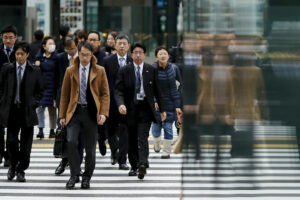Japan unions will unveil results of wage talks, presaging shift at central bank
TOKYO – Japan’s largest trade union group is due to announce results of this week’s annual wage talks on Friday, with expectations for a rise of more than 4%, which would be the biggest boost since the early 1990s and strengthen the case for a central bank shift. The Rengo union group will unveil the results on […]

TOKYO – Japan’s largest trade union group is due to announce results of this week’s annual wage talks on Friday, with expectations for a rise of more than 4%, which would be the biggest boost since the early 1990s and strengthen the case for a central bank shift.
The Rengo union group will unveil the results on Friday at around 4:15 p.m. (0715 GMT), officials said, days after Toyota Motor 7203.T, the bellwether of annual talks, unveiled its biggest pay increase in 25 years, prompting analysts to raise pay hike projections to 4% or more.
Analysts had previously seen increases at around 3.9% this year, after last year’s 3.6%, itself a three-decade high.
Rengo represents about 7 million workers, many at large companies.
Japanese businesses are facing a chronic labor shortage due to an ageing and dwindling pool of workers. Prime Minister Fumio Kishida is pushing companies to raise wages to help Japan shake off years of deflation.
The higher wage hikes are likely to boost expectations the central bank will end negative interest rates as early as its next policy setting meeting on March 18-19.
“Taken together, we can expect hikes to top my forecasts to reach around 4.5% or closer to 5%,” said Yasunari Ueno, chief market economist at Mizuho Securities.
“That should give the Bank of Japan a strong tailwind as the central bank is expected to remove negative rates policy as early as in March.”
On Wednesday, Panasonic 6752.T, Nippon Steel 5401.T and Nissan 7201.T were among some of Japan Inc’s biggest names that agreed to fully meet union demands for pay hikes at the annual wage talks.
The annual pay negotiations – called “shunto” or “spring labour offensive” – are one of the defining features of Japanese business, where relations between labor and management tend to be more collaborative than in some other countries. – Reuters














